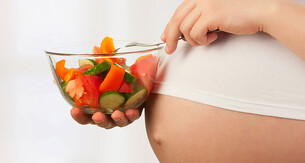Niacin belongs to the group of B vitamins. The body needs niacin for the metabolism of the brain – it regulates the blood sugar – and also for the cellular respiration, the muscles and the connective tissue. Many enzymes which are involved in the energy turnover require niacin. But niacin can do more than that: it has a positive impact on mood, sleep and heart rate. Last but not least, niacin helps to detoxify the body.
During pregnancy and breastfeeding, the requirements are between 15 and 17 mg per day.





